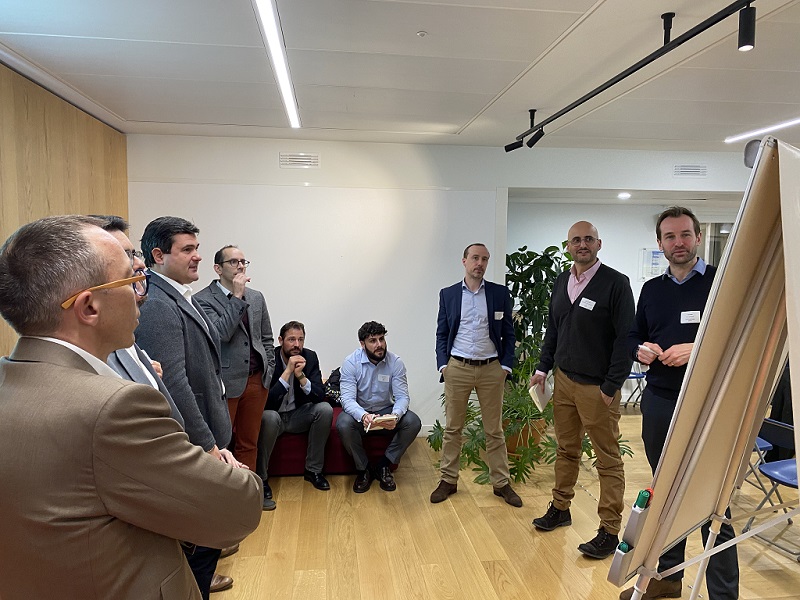The International FP&A Board in Paris met to bring together the latest financial trends. FP&A professionals...
On 9 February 2023, the International FP&A Board held its fourth face-to-face meeting in Paris.
Spaces Les Halles in the heart of Paris welcomed 32 senior FP&A professionals from leading companies to discuss key steps to move from FP&A to Extended Planning & Analysis (xP&A). The representatives of different businesses such as Air France – KLM, Cargill, J&J, the Coca-Cola Company, Plastic Omnium, Sanofi, CWT, Lundbeck, Renault, Huawei France, Carrefour Banque, and many others joined the International FP&A Board event.
The meeting included the following:
- Key concepts, definitions, and essential success factors for the journey to xP&A presented by Larysa Melnychuk;
- Practical insights from the field delivered by Paul Nicolas, CFO for Grid Services at GE Renewable Energy; and
- Small groups work.
During the introduction, each Board member was requested to mention the biggest FP&A challenge they face in their company. The following are the most challenges cited by participants:
- data quality;
- uncertainty;
- agility;
- digitalisation;
- change management.
.jpg)
Figure 1: Paris FP&A Board Members (February 2023)
To overcome those challenges, companies should move from the traditional FP&A to Extended Planning and Analysis (xP&A). The traditional method is characterised by a scheduled approach with one future, disconnected processes with multiple planning systems, and inflexible models with separate data silos. On-demand multiple scenarios, an integrated planning platform with a single continuous process, and agility with data-driven decision-making define the xP&A approach.
Only ten event attendees implemented the three-way model connecting P&L, Balance Sheet, and Cash Flow.
Practical Insights from the Field
Paul Nicolas, CFO for Grid Services at GE Renewable Energy, shared some of his insights from the field. He started with a two-folded question:
As for question number 1, he illustrated the xP&A model using the business strategy cycle: a set of actions to define, deploy, execute, measure, and correct the business strategy. Paul said accelerating the business strategy cycle is crucial because it allows the company to take corrective actions thanks to measuring leading indicators.
The xP&A model is at the core of the business strategy cycle and is more about operations than finance. It helps understand the key drivers, measure performance on leading operational indicators, integrate systems and automate data flow to compress and accelerate the cycle, allowing more agility.
He illustrated his views with an example in which the company has set an objective of improving OTD (on-time delivery) by 5% by 4Q23. The OTD is one of the strategic goals of GE Renewable Energy. Each contributor (or unit) in the value chain must know the metrics that make them successful and that they must track. In his example, some corrective actions should be taken in the PO placement unit if this contributor does not deliver on its objectives. The following points are critical to success:
- starting small and fast;
- involving business stakeholders early for ownership;
- massive benefits from quick feedback loops and automatic data flows;
- and cultural shift because xP&A drives autonomy and entrepreneurship.
As for question number 2 regarding the skillsets necessary for his team to succeed, he said that being agile is key to adapting to new situations. Furthermore, having business acumen is important to understand the link between the drivers and the financial results, while IT and data analytics allow connecting information systems and value data. He also emphasised that having a system of thinking is crucial. Key success factors are connecting strategy with operations and finance. Mastering emotional intelligence for influencing and convincing stakeholders is also highly important.
He also stressed that this mixture of hard and soft skills should be covered as a team, and every team member does not have to possess all of them.
.jpg)
Figure 2: Skillset That Your FP&A Team Needs for xP&A (Source: Paul Nicolas's Presentation at the 4th Paris FP&A Board)
Small Groups Work
What are the practical steps for xP&A implementation? The participants were divided into three groups to respond to that question. Each group discussed a specific aspect of this question. Below are the insights that come out of the group discussions.

Figure 3: The FP&A Board Members Enjoyed Group Work
Group 1: Data and Models
This group advised starting with the business needs, then moving to the creation of models, and then finishing with how to capture data. They identified the following challenges:
- Defining and picking relevant KPIs;
- data quality and availability;
- data governance;
- integration of systems.
This group also advised the following best practices:
- starting early with what you have;
- exposing and democratisation of data;
- ownership of data and assumptions;
- buy-in for the model.
Executing those practices should build data confidence.
Group 2: Systems and Processes
This group stated that there were many dependencies between the systems and the processes. They came up with the idea that it is crucial to understand the strategy, which should be translated into the business and KPIs. The processes should provide clarity and understanding of the business, allowing the KPIs to contribute to the strategy.
Group 3: People and Culture
This group stressed the need for continuous finance training for all departments. They also mentioned cultural accountability. Each department needs to be accountable for the figures and strategy, while the sponsors will help achieve this accountability. Members of this group also advised the following actions:
- improving teams’ skills;
- performance management;
- incentives to drive this improvement;
- ownership and governance in terms of who leads the xP&A.
The end of the meeting was characterised by a lively networking session, allowing the participants and the organisers to connect and undertake in-depth discussions of the critical topics of the meeting.
Conclusion
The International FP&A Board brings together the latest financial trends and a group of dedicated FP&A leaders. This meeting explored the key elements necessary for an efficient journey towards Extended Planning and analysis (xP&A).
.jpg)
Figure 4: Networking During the Paris FP&A Board (February 2023)
Our Sponsors and Partners
We are grateful to our sponsor Wolters Kluwer, and partners Michael Page and IWG for their great support for this event.
Subscribe to
FP&A Trends Digest

We will regularly update you on the latest trends and developments in FP&A. Take the opportunity to have articles written by finance thought leaders delivered directly to your inbox; watch compelling webinars; connect with like-minded professionals; and become a part of our global community.




